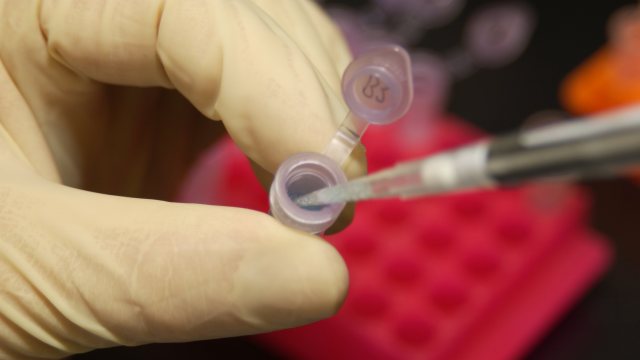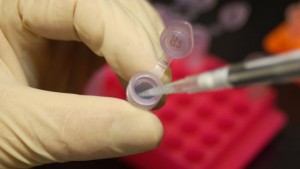Bay Area Biotech Industry Braces for Gene Patenting Court Case

Bay Area Biotech Industry Braces for Gene Patenting Court Case
Bay Area biotechnology companies are keeping an eye on the nation’s highest court. On Monday, the Supreme Court will hear a case on a key question: can you patent a human gene?
A recent study estimates that close to half of human genes identified so far are already patented. The court’s ruling could put millions of dollars at stake for Bay Area universities and biotech companies.
At issue are two genes related to breast and ovarian cancer, BRCA 1 and BRCA 2. Women with mutations in these genes are five to eight times more likely to develop breast cancer. To gauge that risk, patients often get a genetic test. It’s one of the most common tests that genetic counselors handle, like Julie Mak at UCSF’s Cancer Centerin San Francisco.

“I do think it opens up a very loaded set of questions for people who are sometimes very young,” says Mak. “As you can imagine, the things we talk about with people are very serious and sometimes stressful and upsetting.”
A blood or saliva sample can tell a woman if she has those mutations, but that test isn’t run at UCSF. “For most BRCA 1 and 2 testing, the lab in Utah is the only one that does this testing,” Mak says, referring to Myriad Genetics.
Myriad Genetics holds patents on not only the test, but the actual genes themselves. That means one company has a monopoly on those genes and theoretically controls what can be done with them. That’s what’s being challenged by the American Civil Liberties Union.
Natural or Not?
“A lot of people wonder: how can you patent a gene?” says Mildred Cho, associate director of the Stanford Center for Biomedical Ethics.
In the case, the ACLU is arguing that genes aren’t patentable because they’re naturally occurring -- they’re found inside our bodies. According to patent law, “products of nature are not patentable,” Cho says.
Myriad Genetics argues that by extracting a specific gene and isolating it, it turns into a man-made invention, which makes it patentable. “In order to analyze to DNA, you have to break open the cells and break the DNA up in to little pieces,” Cho explains.
Legal complexities aside, Cho says it has real effects on our healthcare decision, like getting a second opinion. “No laboratory has 100 percent accuracy and so you would ideally want to have a lab result that’s really important confirmed by another lab,” she says. “You can’t do that if there are patents on that lab test.”
Questions of Open Access
Patents can also affect genetic research, according to UCSF professor Dr. Robert Nusssbaum. When I meet him in his office, he’s wearing a button pinned to his shirt.
“So my button says ‘free the data,'” he points out.
Since DNA doesn’t come with an instruction manual that reveals if a genetic mutation is harmful or not, the only way to find out is to compare it to thousands of other genetic tests.
“The only way to make that happen faster is for all the laboratories to pool all their information in one place and all have access to it,” Nussbaum says.
But not everyone is sharing. “There are a couple of laboratories, and Myriad is one of them, that have decided that since they had the patent on testing, that they would keep their data locked up as intellectual property,” he says.
In response, Nussbaum has organized an open source database that holds genetic data about breast cancer mutations, free for researchers to use.
“In terms of gene testing, I think patents are of no value, period,” says Nussbaum.
Basis of Biotech
“Patents are a very important, fundamental part of the foundation on which the biotechnology, biopharmaceutical industry has been built,” says Sean Johnston, general counsel at Genentech in South San Francisco, one of the largest biotech companies in the world.
Companies like Genentech use genetic information to develop drugs and treatments, in addition to genetic diagnostic tests.
“Biotech and biopharmaceutical companies have relied upon patent protection to justify the significant investment, the risk-taking and the innovation that is necessary to develop new drugs,” Johnston says.
Johnston says it often takes a billion dollars to bring a drug to market, an investment that could be tougher to make without the protection of gene patents.
“It’s not a matter that if the court were to rule broadly our business would be destroyed,” Johnston says. “But in theory I think it has the potential to be very disruptive to the industry.”
Universities in the Middle
Biotech companies here aren’t the only ones watching this case. The University of California as a whole is one of the top ten gene patent holders in the country.
“Universities are often accused of patenting solely for the purpose of getting financial gain,” says Karin Immergluck of UCSF’s Office of Technology Management. The office handles several hundred gene patents.
“UCSF’s first goal is to translate our really exciting, cutting-edge technologies into products and services that will benefit the public,” she says.
The university walks a fine line. Companies pay millions of dollars a year to use its patents, like the one related to human growth hormone. But the court case brings up issue in licensing patents that universities already grappling with.
“For example, making sure the rights aren’t completely locked up in one company so that underinsured patients don’t have access,” says Immergluck.
Patient access, biotech industry profits and innovation could all be affected by the Supreme Court’s ruling. It’s expected in June.
